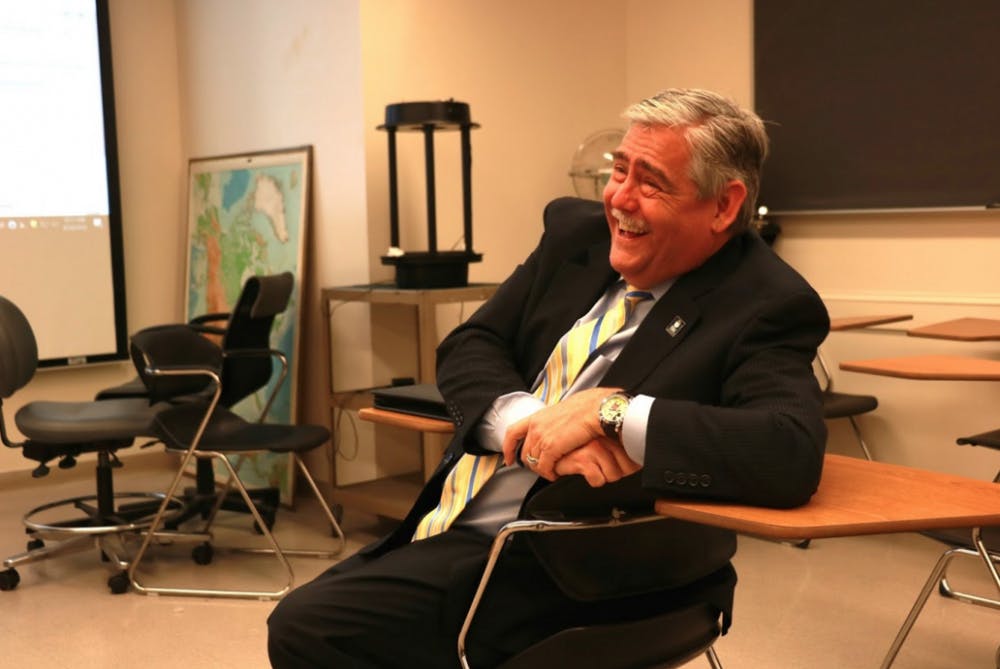By Samantha Malnick
Staff Writer
The College’s Committee on Student and Campus Community held an open forum to discuss the draft policy of its preliminary recommendation on service and emotional support animals on April 18.
In September 2017, the Steering Committee charged the CSCC to determine whether the procedures in the Service and Emotional Support Animals policy sufficiently addressed the conflicting needs of the campus community aside from members requesting a service animal.
In this draft policy, the College recognizes the importance of service animals and the broader category of assistance animals that “provide physical and/or emotional support to individuals with disabilities.”
The policy states that the College is committed to allowing full participation and equal access to programs and activities for service animals on campus, and individuals with ESAs will have an equal opportunity to live with their animal in campus housing.
“We are just the first step of a multi-layered process,” said Suriza van der Sandt, co-chair of the CSCC and associate professor of mathematics. “In this stage, we work very closely with several interested offices on campus such as Janice (Vermeychuk) of Student Health Services and Amanda Radosti of the environmental program, who are with us today.”

As outlined in the policy, the definition of “service animal” is an animal individually trained to do work or perform tasks for the benefit of an individual with a disability, including, but not limited to, guiding individuals with impaired vision, alerting individuals who are hearing impaired, providing minimal protection or rescue work, pulling a wheelchair or fetching dropped items.
An ESA is an animal that provides necessary emotional support to an individual with a mental or psychiatric disability that alleviates one or more identified symptoms of an individual’s disability. Not all ESAs are professionally trained and they are not considered service animals, according to the policy.
For both service animals and ESAs, Meghan Sooy, the director of Disability Support Services, must grant approval of the animal prior to its arrival on campus.
Service animals can be approved to enter classrooms and campus facilities, while ESAs are only allowed inside campus housing and are not eligible for approval elsewhere on campus.
One of the largest components that the College has to work with to accommodate these animals is the Fair Housing Act. The Humane Society of the U.S. simplifies the FHA as a federal law that prevents discrimination against tenants in their homes. The FHA currently has no federal restrictions on the species of the animal in the emotional support role.
Some of the criteria that DSS uses to approve ESAs includes the size of the animal (if it is too large for available assigned housing space), age (if it is less than six months old), up-to-date vaccinations and past experience with aggressive behavior.
“The FHA is a law, and so we put these safeguards so that everyone’s interest is being balanced,” said Janice Vermeychuk, director of Student Health Services.
One concern brought up at the forum was potential damages caused by the allowance of support pets in residence halls.
“After an animal has been living in a dorm, extensive cleaning has to be done, carpets need to be pulled — you never know who will be living there next or whether or not they have an allergy,” Vermeychuk said.
Through this new policy, the CSCC has developed more explicit regulations on service animals and ESAs by addressing issues such as allergies and other conflicts that might affect residents.
“You have to think about things like litter boxes, a dog barking all of the time and everyday disruptions that can affect a student’s experience,” Vermeychuk said. “Who will ensure that the animal is well kept or bathroom trained? Owners have responsibilities and we need to balance the needs of everyone.”
Along with the open forum, the CSCC has released a Qualtrics survey to gather data about the inclusion of service animals and ESAs at the College. The program wants to hear different perspectives on the issue. The goal of CSCC is to have this policy passed by the end of this semester.
“This committee has worked on a variety of policies just this semester and has made tremendous progress due to the hard work of the members,” van der Sandt said. “It is a very dedicated group of faculty, staff and students which has led to us being able to move this policy forward in such a fast pace.”







